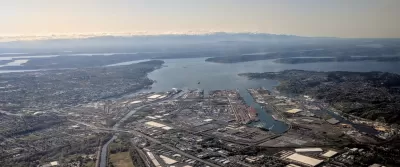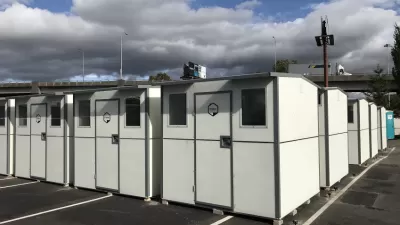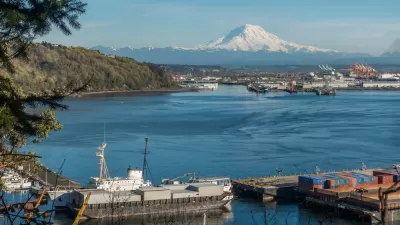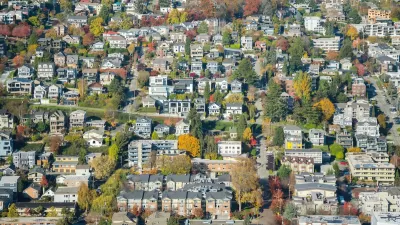Even with a year-long halt on new projects, the city is grappling with plans for industrial land use.

Eric de Place and Aven Frey report on developments in the industrial port area of Tacoma, Washington, called the Tideflats. Last year, the city council passed a moratorium on new fossil-fuel projects to give the city some time to develop a plan for the area. “It was also an unequivocal statement that Tacoma is moving in a new direction: toward cleaner and less divisive development,” say de Place and Frey.
The city council is considering renewing the moratorium, which will expire next month. But other controversial projects are still on the horizon, including a liquefied natural gas plant and expansion of operations at an oil refinery
In addition, a petroleum facility is seeking permits to bring in natural gasoline, a fracking byproduct. “Natural gasoline, sometimes used as a transportation fuel, would be delivered to the site by trains with as many as 107 tank cars, passing near residential areas, important water bodies, and the Puyallup Tribe’s reservation along the way,” according to de Place and Frey.
The projects are potential safety and environmental threats to Tacoma but also to the region and the Salish Sea, as these fossil-fuel products are transported. “There’s every reason to believe that dirty energy projects will continue to target the City of Destiny. Yet leaders can choose to expand their protections to preclude growth at existing facilities too,” say de Place and Frey.
FULL STORY: TACOMA CITY COUNCIL FACING CRITICAL CROSSROADS FOR TIDEFLATS LAND-USE

Alabama: Trump Terminates Settlements for Black Communities Harmed By Raw Sewage
Trump deemed the landmark civil rights agreement “illegal DEI and environmental justice policy.”

Planetizen Federal Action Tracker
A weekly monitor of how Trump’s orders and actions are impacting planners and planning in America.

How Atlanta Built 7,000 Housing Units in 3 Years
The city’s comprehensive, neighborhood-focused housing strategy focuses on identifying properties and land that can be repurposed for housing and encouraging development in underserved neighborhoods.

In Both Crashes and Crime, Public Transportation is Far Safer than Driving
Contrary to popular assumptions, public transportation has far lower crash and crime rates than automobile travel. For safer communities, improve and encourage transit travel.

Report: Zoning Reforms Should Complement Nashville’s Ambitious Transit Plan
Without reform, restrictive zoning codes will limit the impact of the city’s planned transit expansion and could exclude some of the residents who depend on transit the most.

Judge Orders Release of Frozen IRA, IIJA Funding
The decision is a victory for environmental groups who charged that freezing funds for critical infrastructure and disaster response programs caused “real and irreparable harm” to communities.
Urban Design for Planners 1: Software Tools
This six-course series explores essential urban design concepts using open source software and equips planners with the tools they need to participate fully in the urban design process.
Planning for Universal Design
Learn the tools for implementing Universal Design in planning regulations.
Caltrans
Smith Gee Studio
Institute for Housing and Urban Development Studies (IHS)
City of Grandview
Harvard GSD Executive Education
Toledo-Lucas County Plan Commissions
Salt Lake City
NYU Wagner Graduate School of Public Service





























